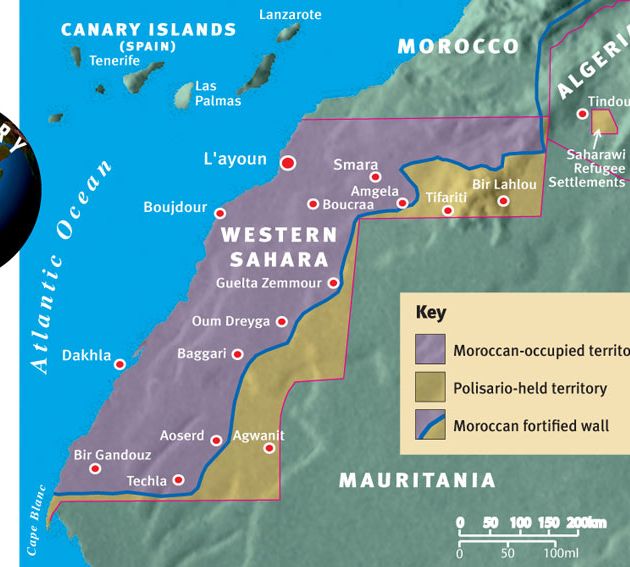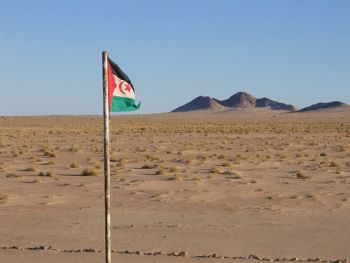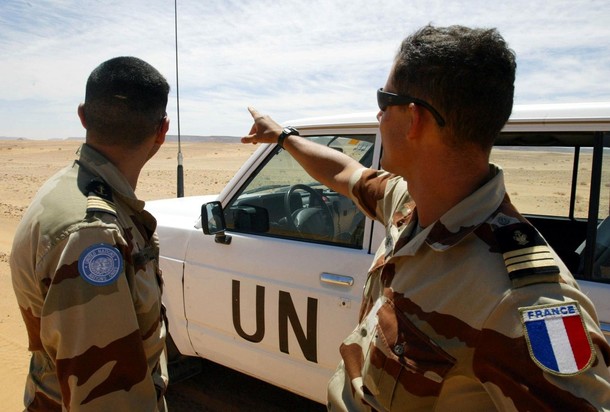 Early on November 8 the Moroccan security forces moved to dismantle the Gdeim Izik tent camp – about 6,500 tents Sahrawis had erected in early October to protest their social and economic conditions in Moroccan-controlled Western Sahara. That set off violent confrontations between residents and security forces both in the camp and in nearby El-Ayoun. Eleven security officers and at least two civilians were killed, by official count. Many public and private buildings and vehicles were burned in the city.
Early on November 8 the Moroccan security forces moved to dismantle the Gdeim Izik tent camp – about 6,500 tents Sahrawis had erected in early October to protest their social and economic conditions in Moroccan-controlled Western Sahara. That set off violent confrontations between residents and security forces both in the camp and in nearby El-Ayoun. Eleven security officers and at least two civilians were killed, by official count. Many public and private buildings and vehicles were burned in the city.
Following the initial violent confrontations, Moroccan security forces participated with Moroccan civilians in retaliatory attacks on civilians and homes, and blocked wounded Sahrawis from seeking medical treatment.
In the aftermath of the violence on November 8, Moroccan security officials detained hundreds of Sahrawis in connection with the disturbances, more than 100 of whom are still being held. Another nine have been transferred to Rabat for investigation by a military court, Sahrawi human rights lawyers in El-Ayoun told Human Rights Watch.
Restricted Access to Information
After the tent camp was dismantled, Moroccan authorities tightly limited access to El-Ayoun, allowing few journalists or representatives of nongovernmental organizations to reach the city and turning back many who tried.
A Human Rights Watch researcher was prevented twice from boarding a flight to El-Ayoun on November 11, and finally flew there on November 12. The researcher and Human Rights Watch’s El-Ayoun-based research assistant were able, from November 12 to 16, to interview injured civilians and police officers in hospitals and at homes. They also met with Mohamed Jelmous, governor of the El-Ayoun-Boujdour-Saguia el-Hamra region.
Overview
Human Rights Watch focused its investigation on human rights abuses following the dismantling of the Gdeim Izik camp – not on the nature of the protest at the camp, the decision to close it, or the way it was closed down.
According to Moroccan authorities, nine members of the security forces were killed during the operation at Gdeim Izik camp on the morning of November 8, and another died during the disturbances later that day in El-Ayoun. The eleventh died on November 17 from wounds he incurred during the disturbances. One civilian died of injuries sustained during the security force operation at Gdeim Izik, a second after a vehicle hit him in during the unrest in El-Ayoun. The public prosecutor ordered a judicial inquiry into the latter case, a government statement said.
second after a vehicle hit him in during the unrest in El-Ayoun. The public prosecutor ordered a judicial inquiry into the latter case, a government statement said.
The security forces involved in the events come from various groups. The troops who intervened at the camp included gendarmes and the Auxiliary Forces, an interior ministry statement said. The forces involved in El-Ayoun included the regular police force, special anti-riot units (groupes d’intervention rapide, or GIR), and the Auxiliary Forces. The latter assists other branches of the security forces and is not part of the interior ministry.
Abuses in Detention
Human Rights interviewed seven Sahrawis detained following the November 8 violence and then released. All alleged that the police or gendarmes abused them in custody, including in some cases beating them until they lost consciousness, throwing urine at them, and threatening them with rape.
Lawyers representing those who remain in custody told Human Rights Watch that at least one detainee told an investigative judge that he had been raped in detention, while many others told the investigative judge and prosecutor about beatings and other abuses they allegedly endured in custody.
According to one of the victims, there were 72 male detainees in gendarme station in El-Ayoun. Firstly they were put in the back of the gendarmes’ truck, all of them were handcuffed behind their backs. They were thrown inside the van like cattle. When the truck reached El-Ayoun, the men were dragged out by their feet and marched into the gendarme station, while being punched and kicked.
The witnesses interviewed by Human Rights Watch had severe bruising and other recent wounds that suggested they had been beaten in custody.
Attacks on Sahrawi Homes
Human Rights Watch visited the Haï Essalam and Colomina Nueva neighborhoods, where numerous homes of Sahrawis were attacked on November 8 and 9 by groups that included security force members and people in street clothes, some of whom appeared to be Moroccan civilians, the inhabitants reported. The people interviewed described how assailants beat residents inside their homes and damaged property. Authorities have reportedly taken steps to compensate homeowners for damage, but have not, as far as Human Rights Watch has been able to determine, announced any arrests or charges against Moroccan civilians implicated in the violence.
About a dozen Sahrawi homes on or near Moulay Ismaïl Street were invaded and damaged. Two blocks away, a group of about 40 soldiers and police officers invaded the home of two older women at 10:30 a.m. on November 8. The women said that the invaders fired anti-riot shotgun shells with plastic pellets into the home, told the family to leave, and stole a computer and jewelry.
When Human Rights Watch visited the rooftop room of one of the attacked houses on November 16, the floor and walls were stained by blood. The men showed the researchers pistol and plastic pellet riot control shotgun cartridges that, the men said, lay on the ground on the roof after the police had assaulted them.
Residents of some  streets where houses were damaged on November 8 and 9 said that later in the week, interior ministry officials came through and arranged to provide some financial compensation.
streets where houses were damaged on November 8 and 9 said that later in the week, interior ministry officials came through and arranged to provide some financial compensation.
A hospital worker told Human Rights Watch that he observed one attack in which police broke the windows of a taxi that drove up to the hospital carrying three wounded Sahrawis, and beat both the wounded men and the taxi driver, before letting the taxi driver go and detaining the three passengers. Several Sahrawis who had been beaten said they did not go to the hospital for treatment, saying they feared the police there.
Police Assault Human Rights Researcher on Street
Police beat Human Rights Watch’s El-Ayoun-based research assistant Brahim Alansari on an El-Ayoun street, when he was in the company of John Thorne, the Rabat-based correspondent for The National, the Abu Dhabi English-language daily.
On November 8 at about 9 a.m., at a time when protesters were throwing stones and security forces were massing in the streets, police stopped the two men on a side street behind the Negjir Hotel in downtown El-Ayoun and demanded to know what they were doing there. After Alansari and Thorne gave their names and professions, the police separated the two men. Alansari described what happened next:
Policemen surrounded me and started to kick me and beat me with their sticks and slap me. They asked me my nationality. When I refused to answer, they seemed angered and started to beat me again. Then a higher-ranking officer arrived and ordered me to reply. I said that I cannot talk while being beaten. He did not order the others to stop hitting me…
One of the police escorted me to where John [Thorne] was seated in a chair. The policeman forced me to sit on the ground next to John, saying that I am a dog and that was my place. After about ten or twenty minutes some policemen approached and told Mr. Thorne to return to his hotel and not to do any work. Then the man in plainclothes asked me not to accompany Mr. Thorne or to take him anywhere and that I should instead go home and stay out of trouble. They returned my phone and ID and gave John his passport, and we both left.
Thorne told Human Rights Watch that he could see the beating from where he was forced to sit, about 15 feet away:
Around a dozen police – some in green jumpsuits, others in blue riot gear – surrounded Brahim and began beating him. I could not see how many policemen struck Brahim, but I could see that he was struck with hands and batons at least twenty times during a few minutes. Then the police made Brahim sit next to me.
Human Rights Watch sent a letter to Moroccan authorities on November 23, detailing this incident and requesting that it be investigated. On November 24 the ministry of interior replied that it had opened an administrative investigation and that the ministry of justice had asked the office of the prosecutor in El-Ayoun to conduct a judicial investigation. Human Rights Watch intends to report on the outcome of these inquiries.
Background
The present conflict over Western Sahara dates to 1975, when Spain, the former colonial power, withdrew and Morocco moved in and seized control over the sparsely-populated desert territory. Morocco has since claimed sovereignty and administered Western Sahara as if it were part of Morocco, even though the UN does not recognize that sovereignty and classifies Western Sahara as a “non-self-governing territory.”
has since claimed sovereignty and administered Western Sahara as if it were part of Morocco, even though the UN does not recognize that sovereignty and classifies Western Sahara as a “non-self-governing territory.”
The Polisario Front, the Western Saharan independence movement, fought a war against Morocco until 1991, when the UN brokered a ceasefire alongside an agreement to organize a referendum on self-determination for Western Sahara’s population.
The referendum has not taken place because of the objections of Morocco, which rejects independence as an option and proposes instead to grant Western Sahara a measure of autonomy under Moroccan rule.
The Polisario continues to insist on a referendum that includes independence as one option. Negotiations to bridge this gap have so far been fruitless. Meanwhile, large numbers of Moroccans have migrated south and settled in Western Sahara, where they now outnumber the Sahrawis who are indigenous to the region.
Under Moroccan rule, advocacy of independence is considered an “attack on territorial integrity,” punishable by law. While not all pro-independence activities in Western Sahara are nonviolent – in some cases, youths threw stones and gas bombs during the recent clashes and damaged property – even nonviolent protests are systematically shut down by the security forces, and nonviolent activists are subjected to unfair trials and imprisonment.
HRH Bergen, based on Human Rights Watch information. Find out more about the abuses in Western Sahara here.
Related links:
Western Sahara: forgotten conflict with suffering people
EFTA-Morocco free trade agreement – new dispute over Western Sahara
Western Saharan hunger strikers – Morocco’s human rights violations
Sahrawis dissatisfied with UN chief and peacekeeping mission MINURSO
Polisario Front calls on UN to supervise human rights in territories under its control
Ease restrictions on Sahrawi – Human Rights Watch
‘Saharawi Gandhi’ under house arrest
Rafto laureate calls on UN and EU to supervise the human rights situation in Western Sahara


